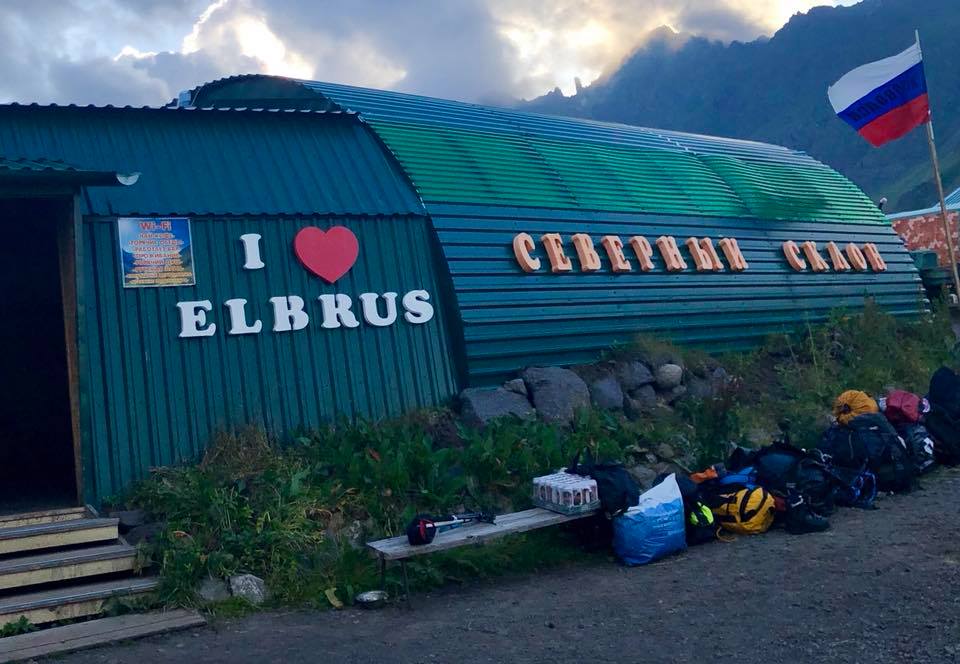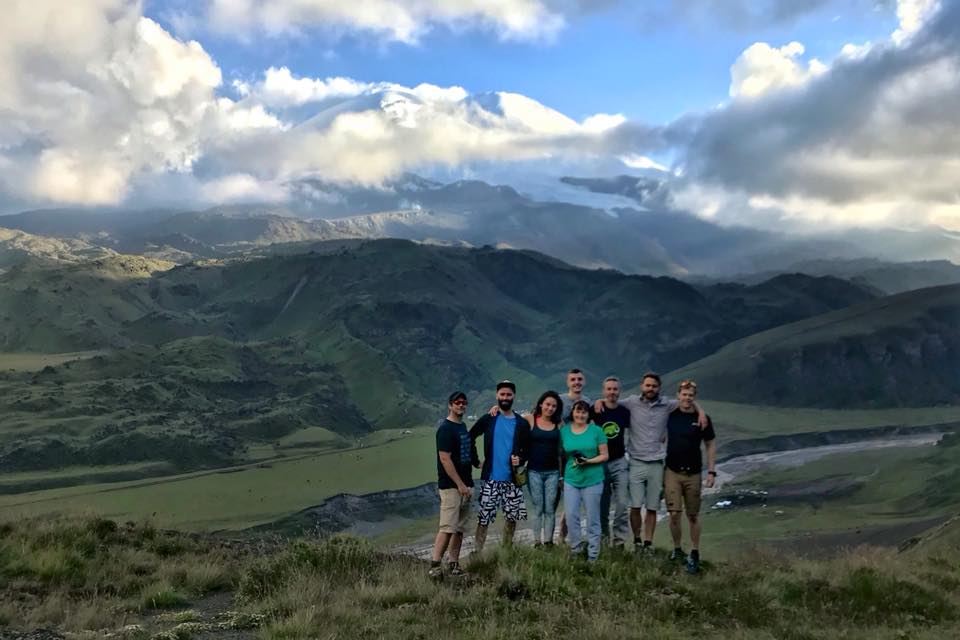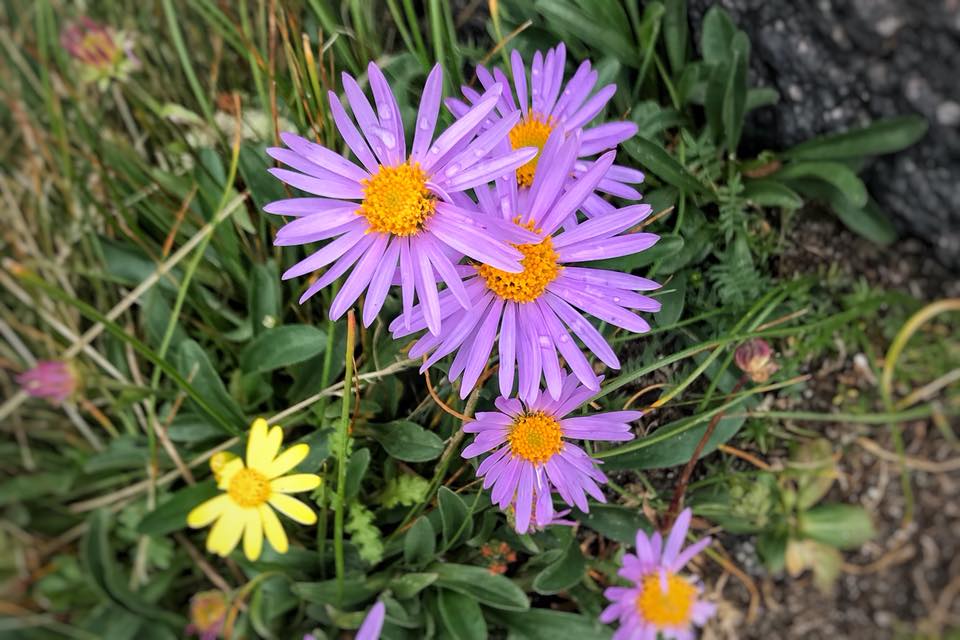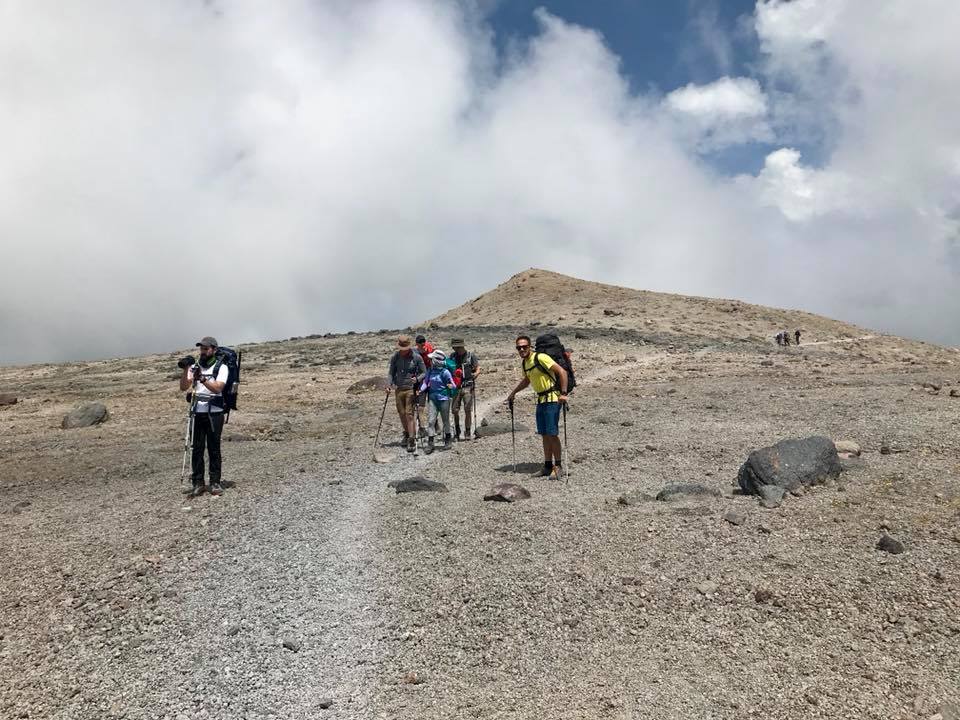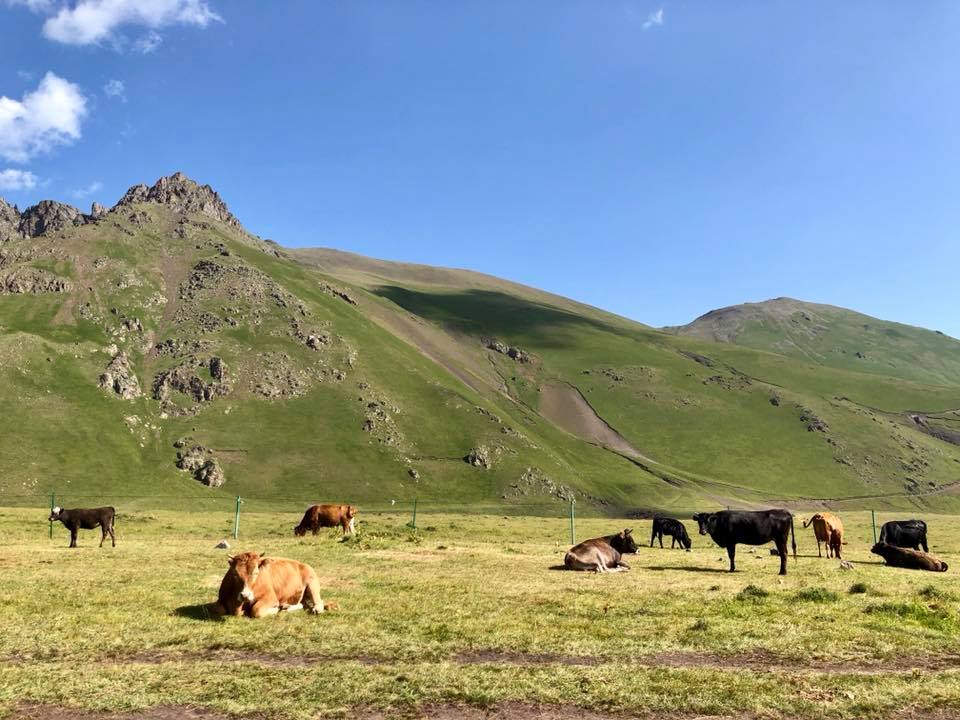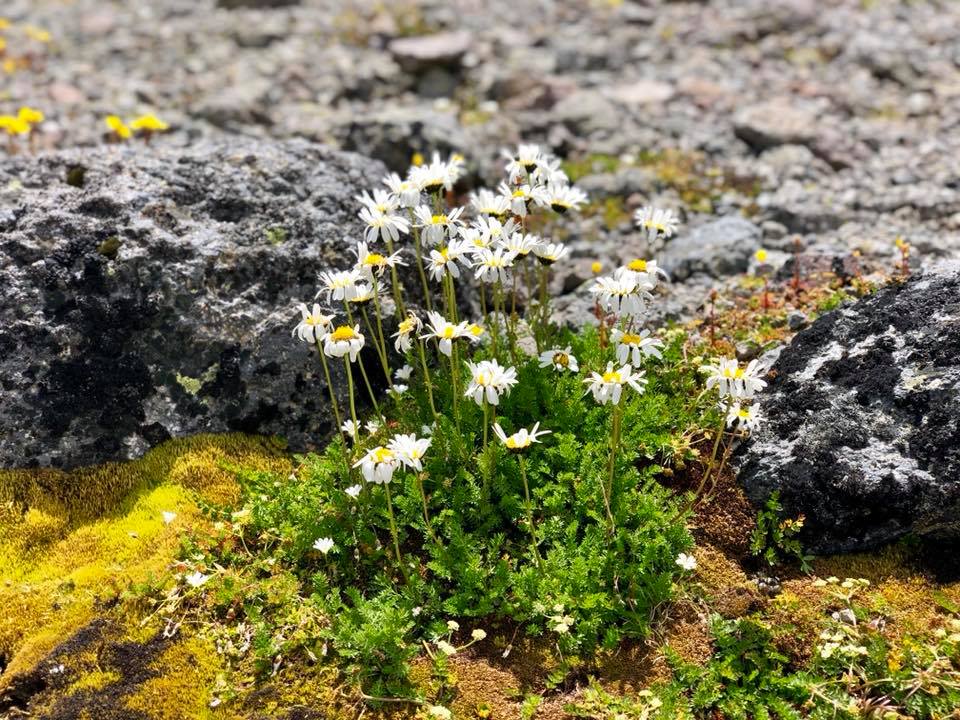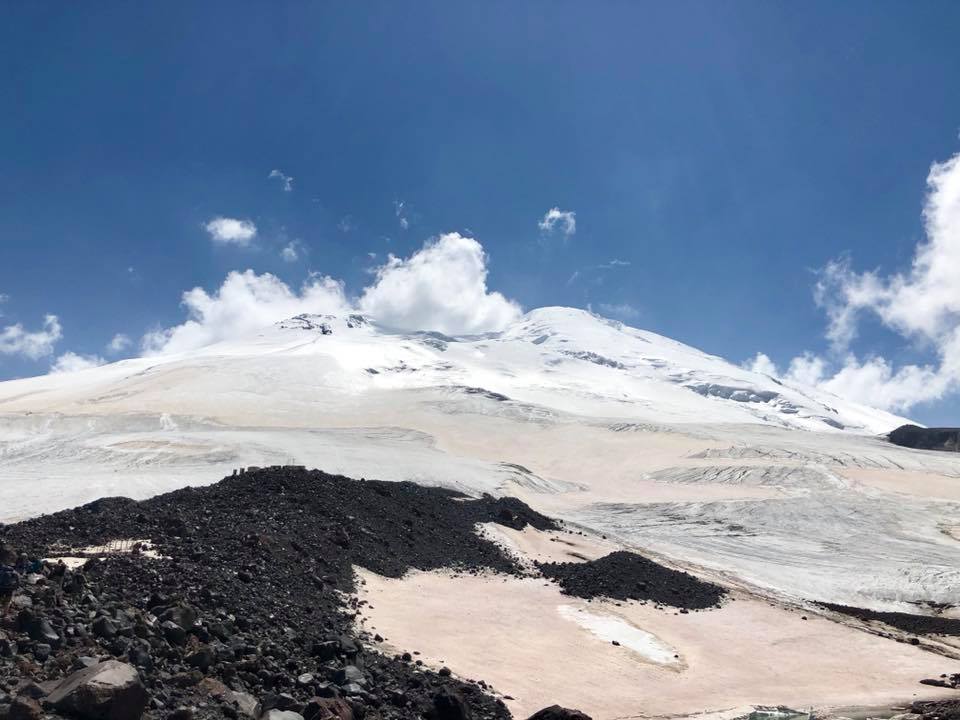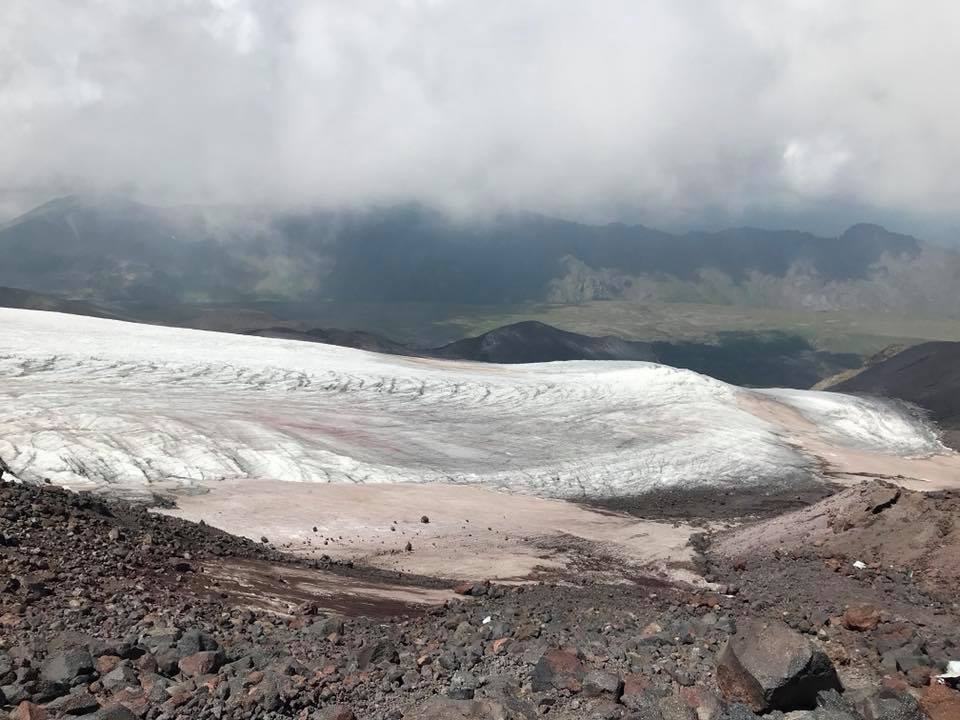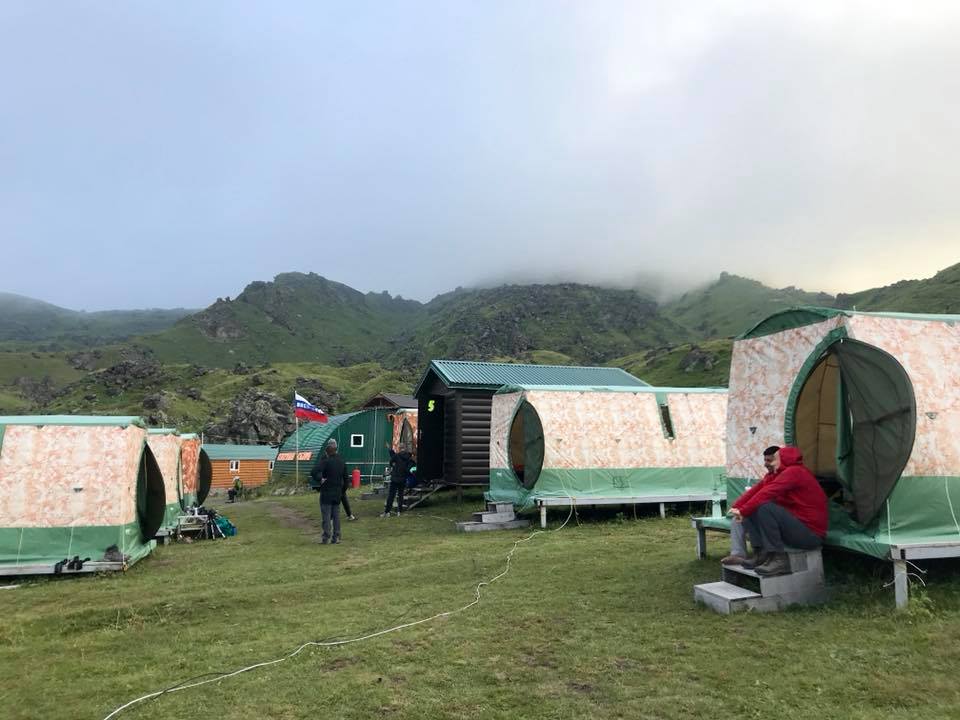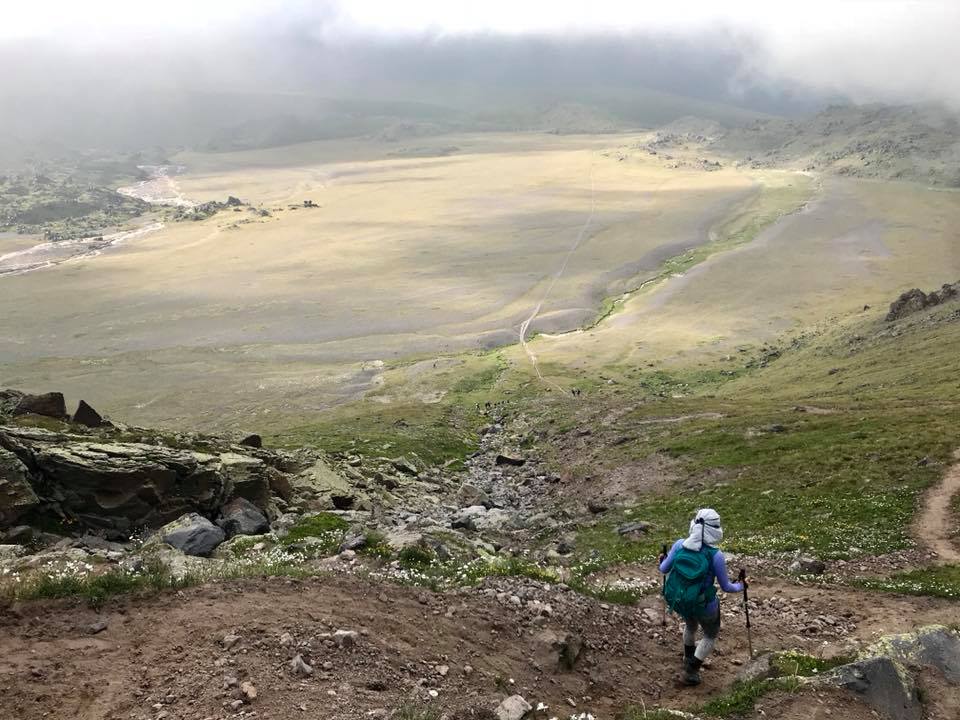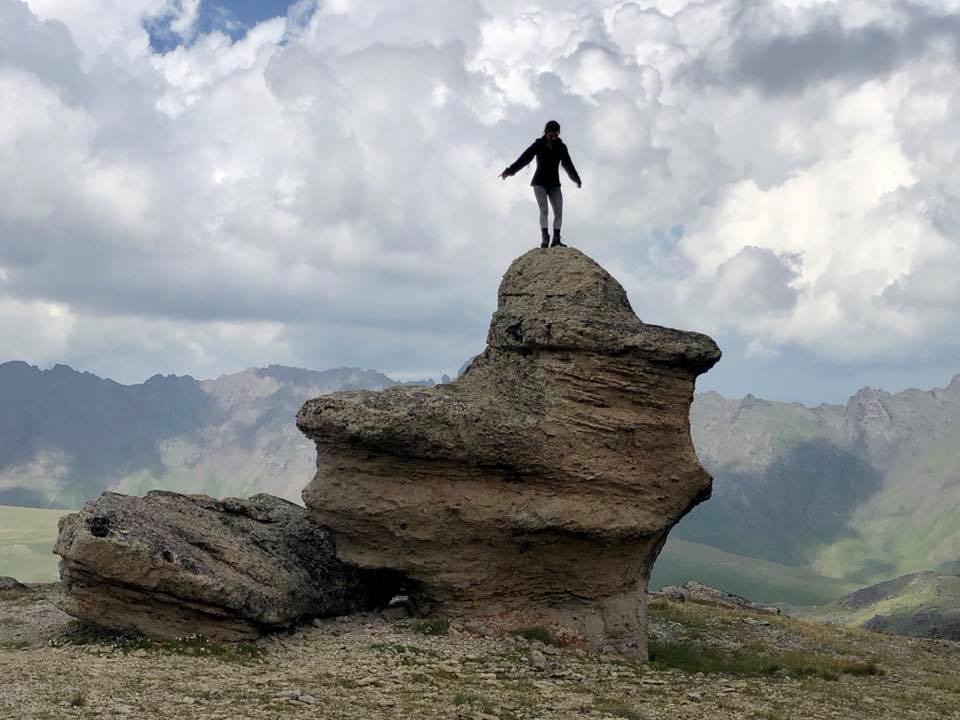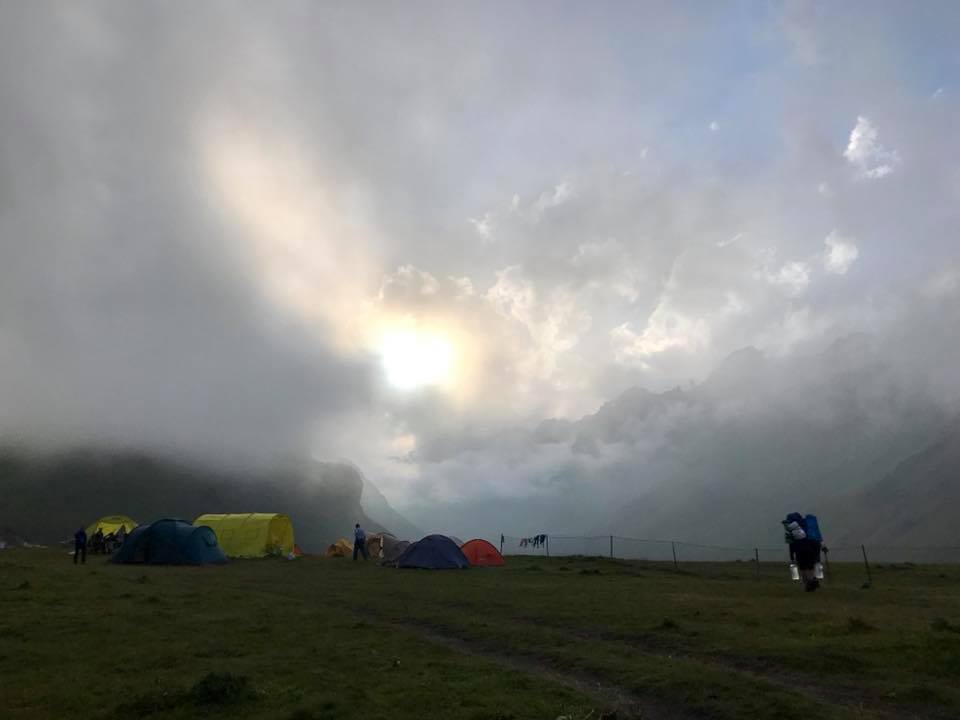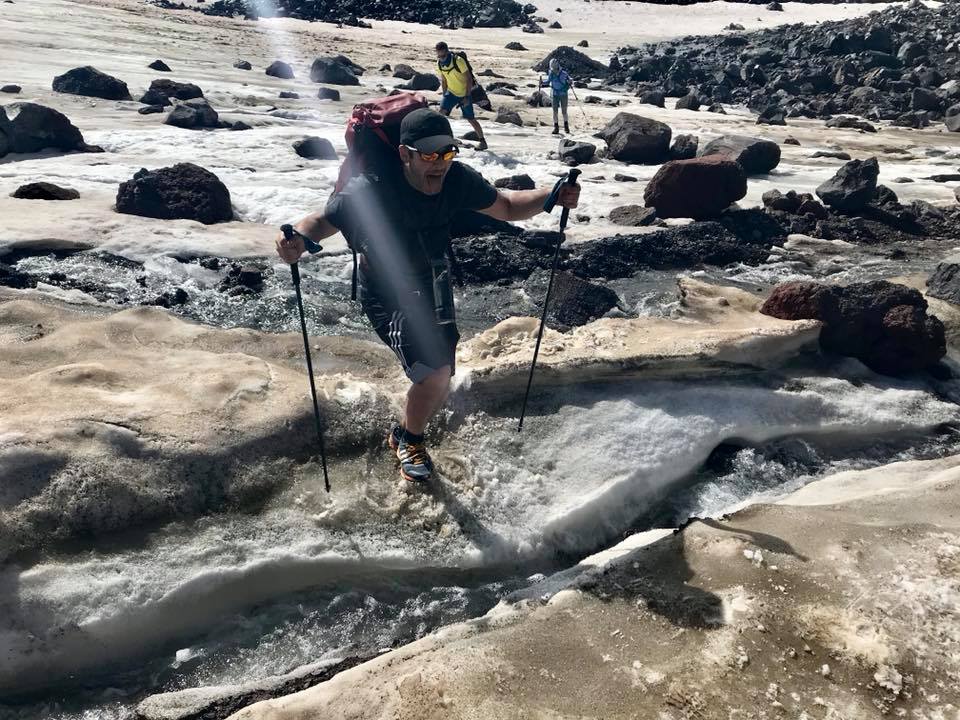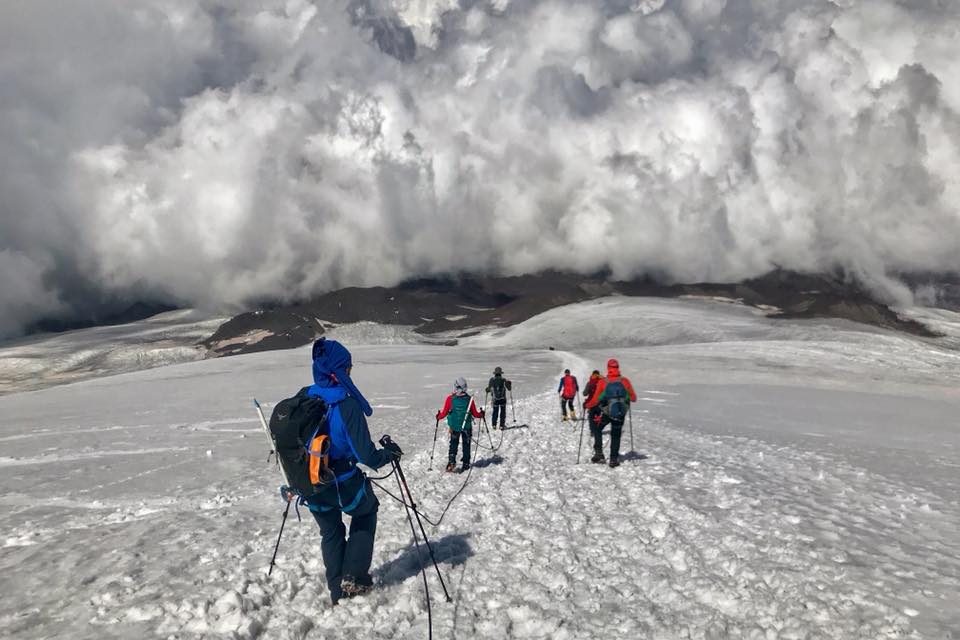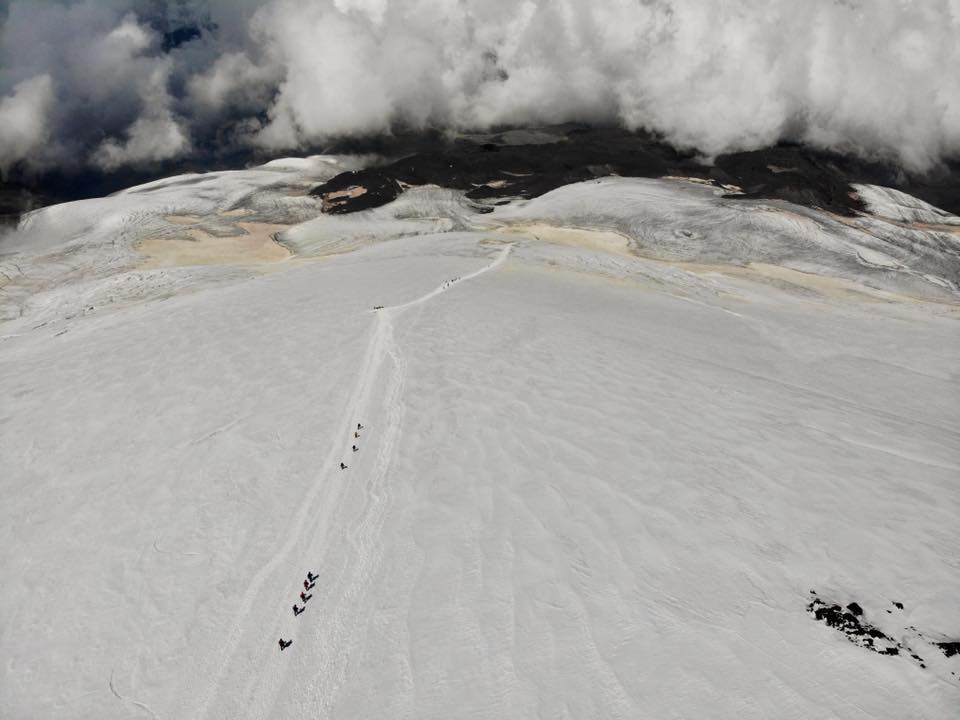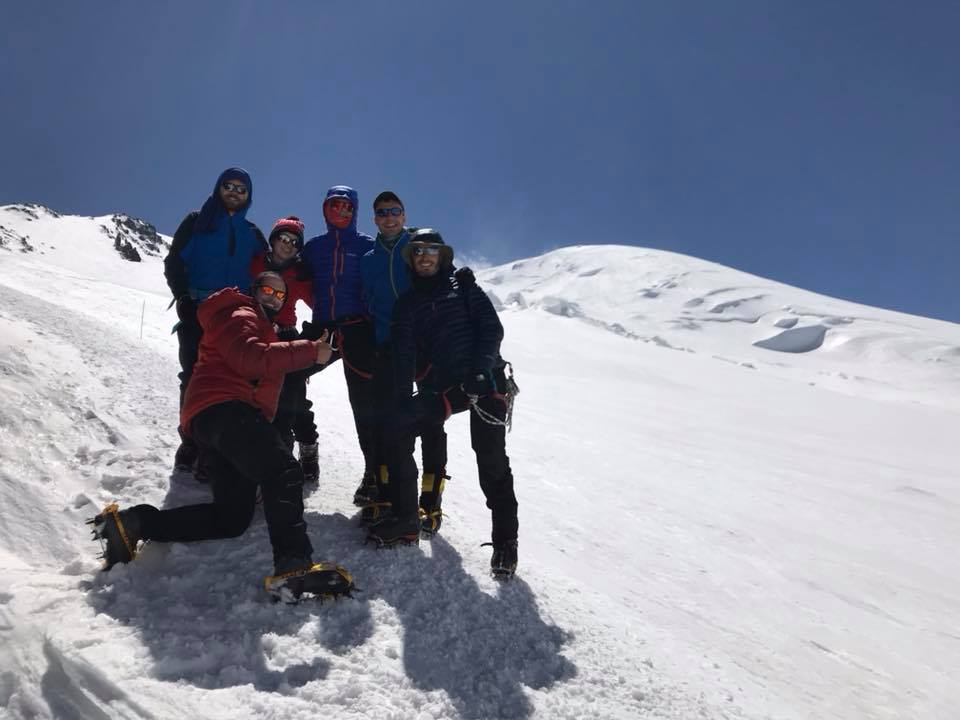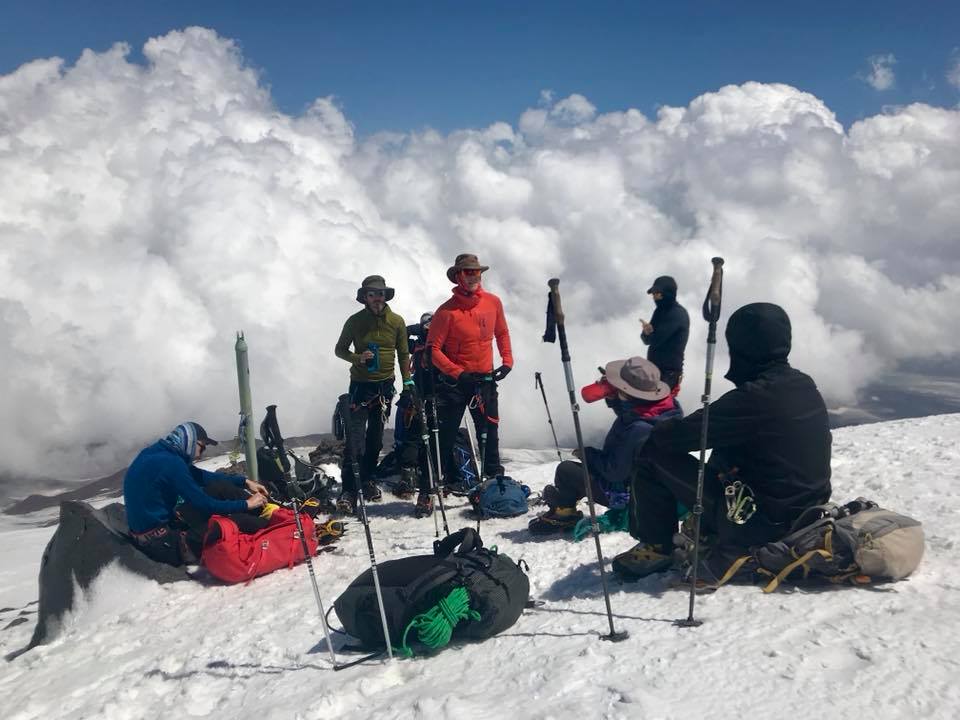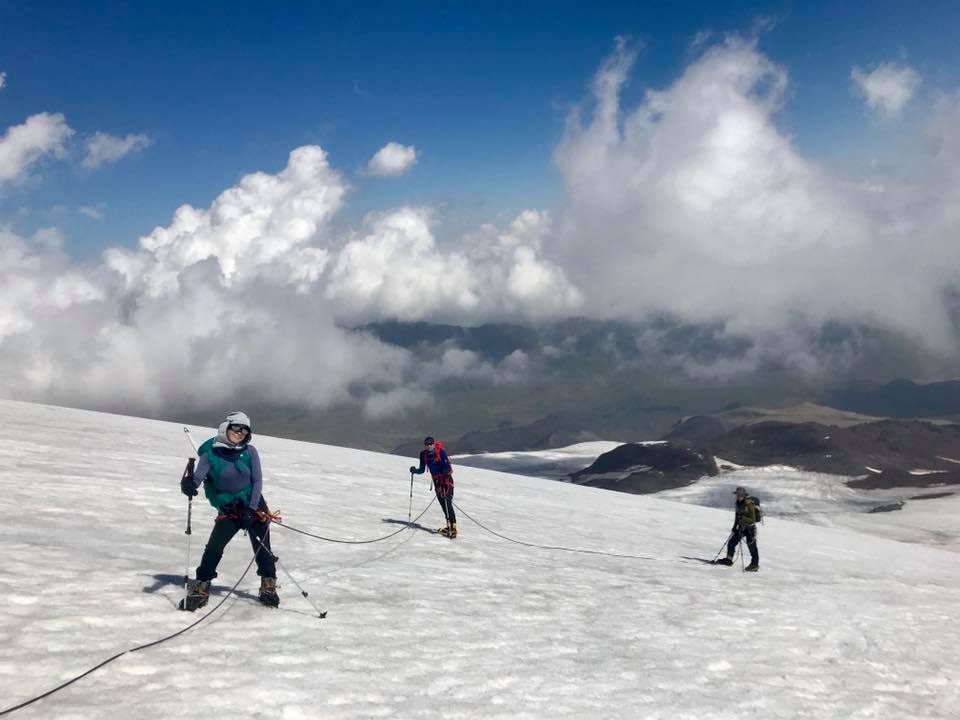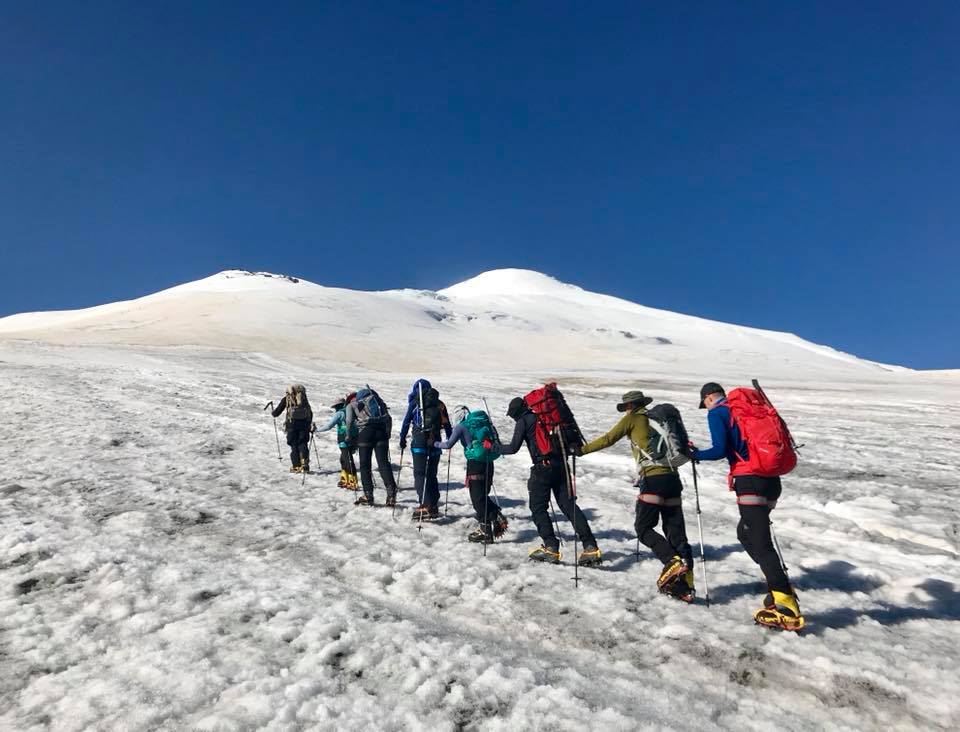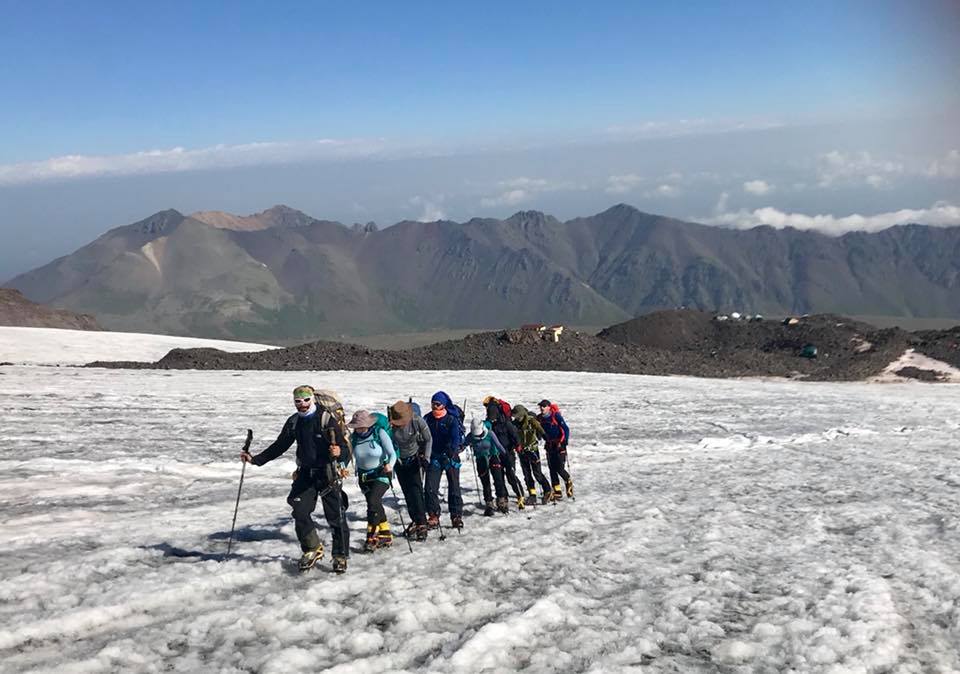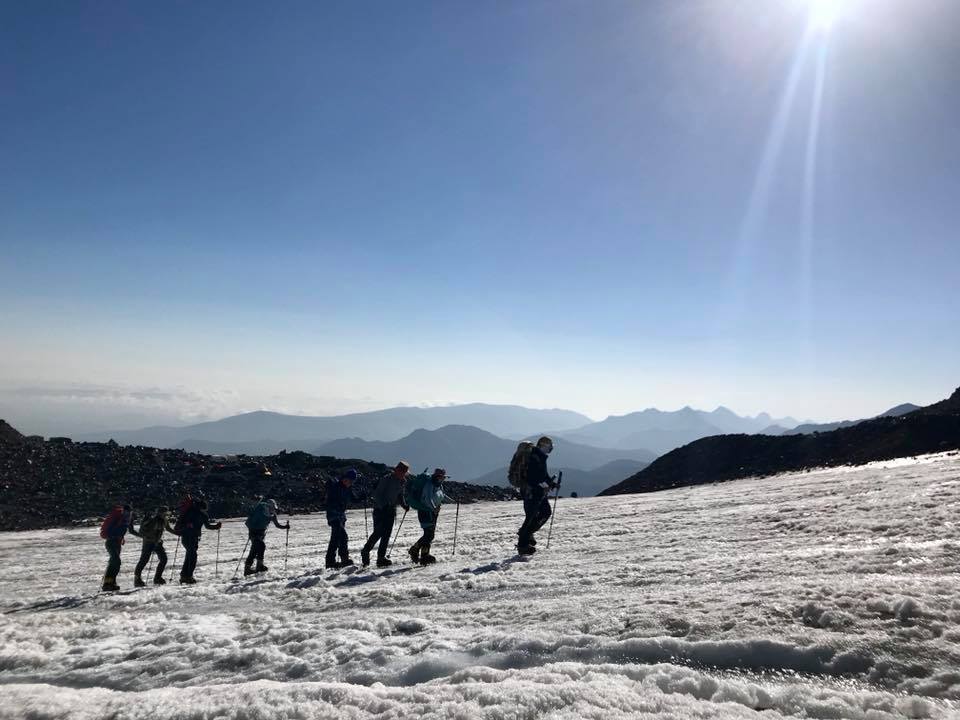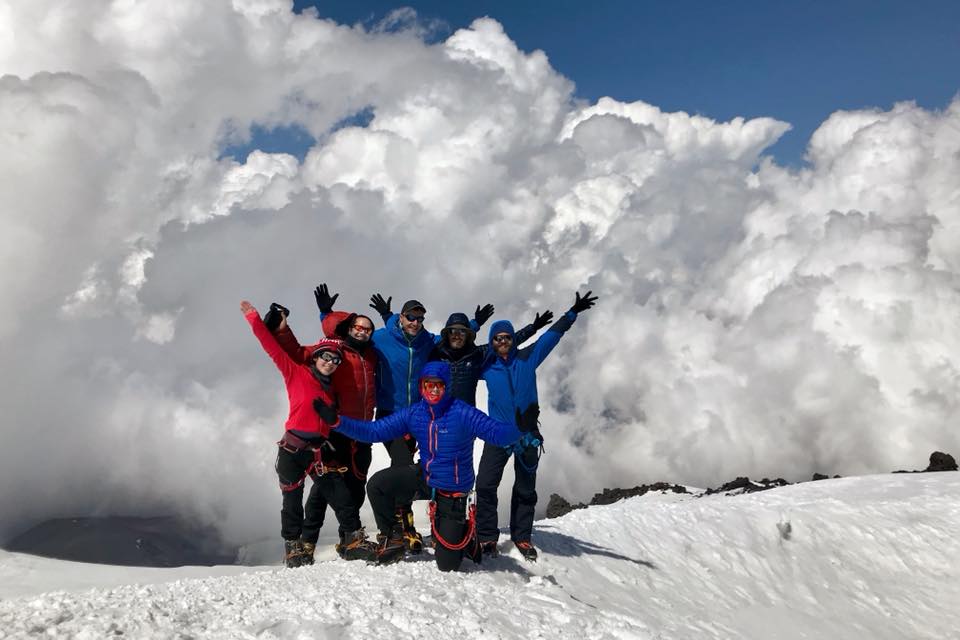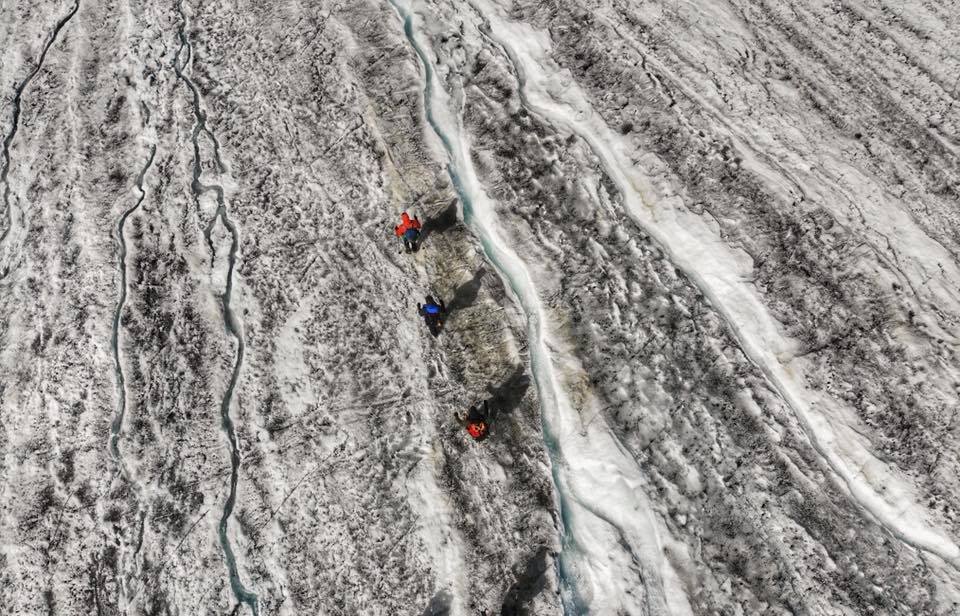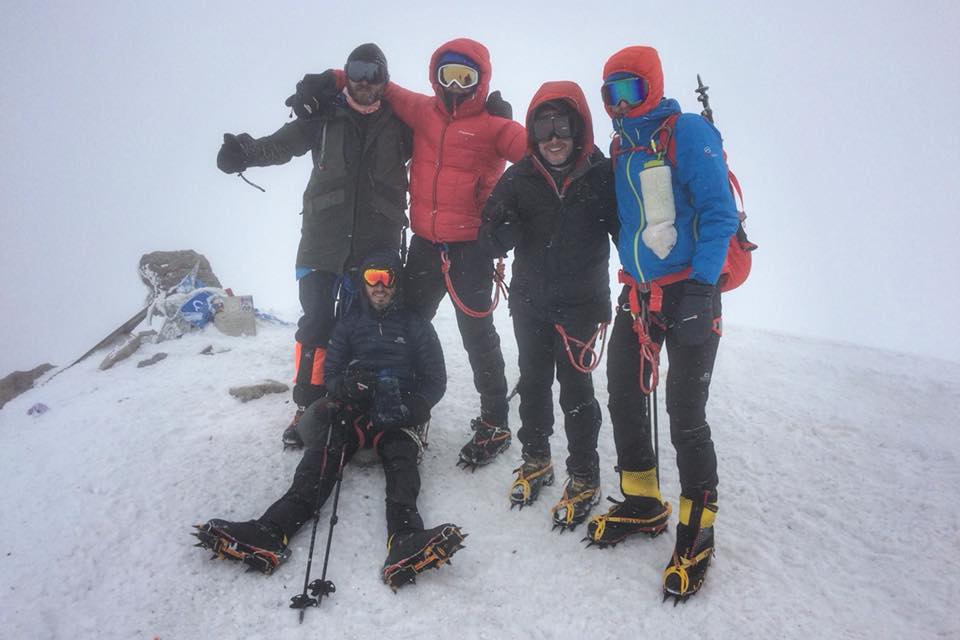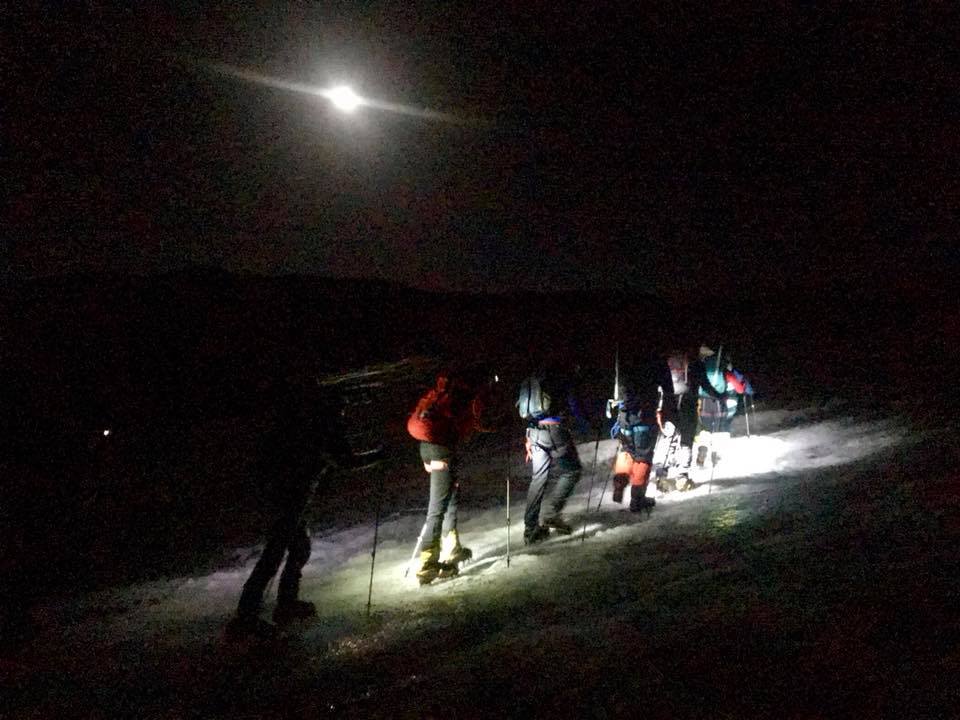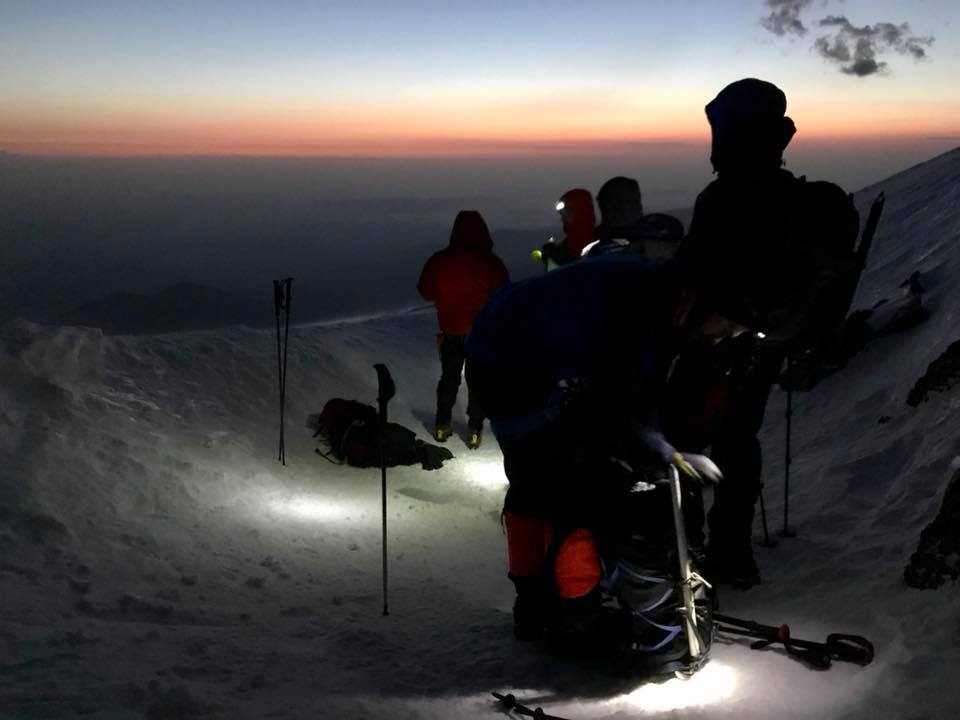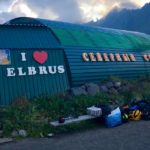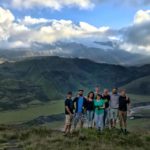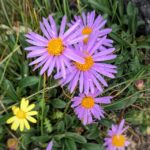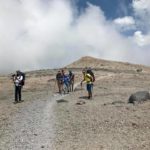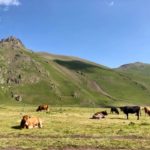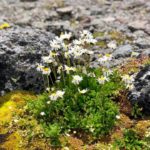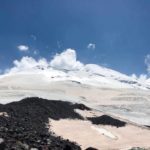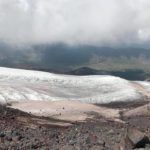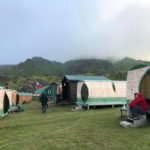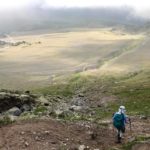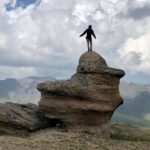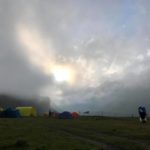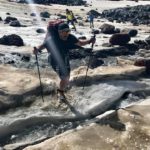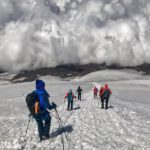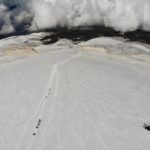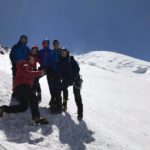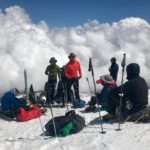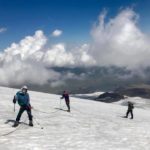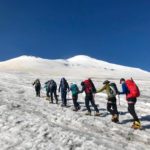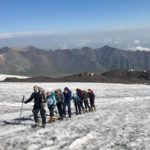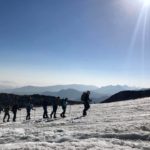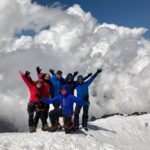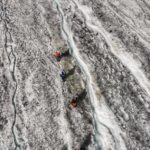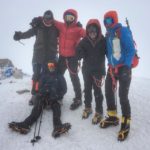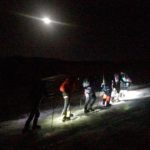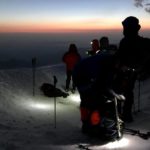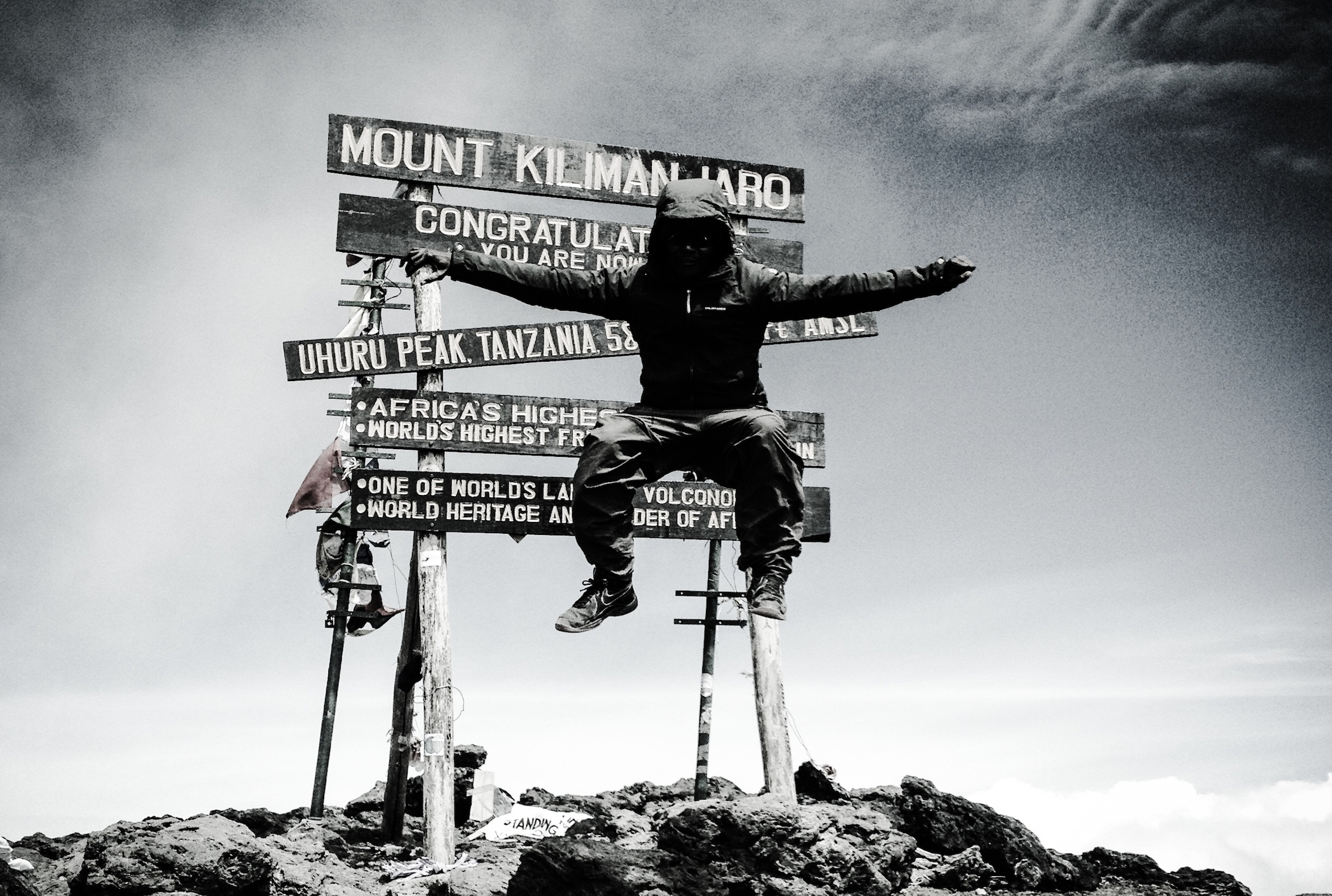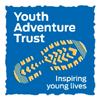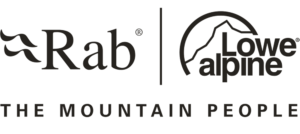Overview
Mt Elbrus at 5642m is Europe’s highest mountain and the perfect first big alpine peak. Technically straight forward, Elbrus presents a fantastic objective as one of the world famous 7 summits!
Situated in the quiet western Caucasus mountain range in Russia, we’ll gradually gain height and acclimatise well, before making an attempt to the highest point in Europe. Once acclimatised, our route follows the northern snow slopes to the col between Elbrus’ twin summits, before ascending to the West Peak – the true summit of Europe’s highest mountain!
Organised and lead by Mountain Expeditions
Mountain Expeditions are expedition specialists – simply put we love organising and delivering world class expeditions. We understand that joining any of our expeditions is a big deal, so we try and make sure everything is perfect from start to finish.
UK Expedition Leader
Mountain Expeditions employ a small number of the UK’s most experienced High Altitude Expedition Leaders and we will always send a UK Expedition Leader to facilitate your expedition. All of our leaders are chosen on their individual merits which we base on their mix of vast mountain experience, interpersonal skills and of course, qualifications.
Fully supported by local cooks, porters & guides
The truth behind organising and leading worldwide expeditions is that you need an excellent local in-country agent to work with. Over the years Mountain Expeditions have developed a long standing relationship with our local crews and the added value of our friendly and efficient local staff never goes unnoticed – we know it makes a big difference to your experience. Our local team are a huge part of your experience and make all the difference on the mountain.
Local Mountain Guides
With all our expeditions we partner with the very best local in-country agencies who shares our ethos of delivering outstanding expeditions. We believe that a combined leadership team built of a UK Expedition Leader and highly experienced local guides is the strongest and most successful way to deliver our expeditions. For Elbrus, a local guide will be with the team throughout the entire expedition and, if ratio’s require them, additional local guides will be used during the summit rotation.
Small teams & personal approach – maximum 8
On big mountains like Aconcagua we don’t believe leading Open Expedition teams of 10+ members is good practice and it certainly doesn’t offer a very personable experience! All our Open Expedition teams are capped at 8 resulting in a close knit, small team experience.
Very high summit success rate
We believe that our high summit success rate is down to a combination of smaller teams and using the most experienced High Altitude Expedition Leaders. This combination has shown time and time again that this is the safest approach whilst on the mountain.
11 day flexible itinerary with a 2 summit day window
Our itinerary has been chosen to make this trip the very best we believe it can be. We’ve built in climb high sleep low days to aid your acclimatisation, a full rest day before your summit attempt and of course there are some big days too! We have also built in a 2 day weather window to allow plenty of time to reach the summit (we can stretch this to three if needed).
A perfect non-technical high altitude peak
There are many reasons people climb big mountains and many reasons why you might choose Elbrus as your next one. Due to its low technicality, Elbrus offers a realistic opportunity to summit a big mountain without having years of experience. Please read our Trip Suitability section to find out more.
Accommodation: hotel & tents
Many of our expeditions start and finish in a bustling city in a really nice hotel or lodge. Maybe it’s first and last impressions that count or perhaps we just enjoy having nice accommodation when starting and finishing a trip but it’s what we do! On the mountain we make sure camp life is as comfortable as we can and ensure top quality camping equipment is used.
Trip Suitability
Although Elbrus is a non-technical ascent, at 5642m metres summit day from the north is a long and extremely tough climb at high altitude. It is a brilliant 11 day mountaineering expedition requiring some basic glacial travel. The expedition is graded B2 to reflect this (refer to the Difficulty Level tab for more details).
Elbrus North is ideal for people who have climbed mountains like Kilimanjaro or for those who’ve done a Scottish Winter Skills Course and are looking for their first big expedition. Previous experience of using ice axe and crampons in winter conditions would be an advantage, but it isn’t essential.
In preparation for any mountain expedition, we offer Expedition Specific Training courses in both winter and summer. This is a great chance for you spend time in the UK mountains with an experienced expedition leader and learn some new skills, getting better prepared for you next big expedition objective. If you are booked on an expedition with us already then we offer a 10% discount on these courses.
If you are unsure if your experience is suitable for Elbrus, please don’t hesitate to Contact Us and we’ll discuss it with you in more detail.
Itinerary
The itinerary below is intended as a guideline only, although every effort will be made to adhere to it, changes may be forced upon it by weather conditions, transport failure or other unforeseen events. You should be prepared to be flexible where necessary.
You can download the itinerary as a PDF here.
Day 1: Arrival in Mineralnye Vody, transfer & briefing
Arrival at Mineralnye Vody airport and transfer to the town of Kislovodsk to overnight at the hotel.
Day 2: Travel to base camp (2500m)
Today we will drive 3 hours Elbrus North Base Camp, the Hathansu Meadow (2500 m), which is at the base of the mountain. The final 4km is quite exciting off-road and we sometimes get out and walk into camp. If time allows we may take a short acclimatisation hike in the surrounding area and overnight at base camp in tents.
Day 3: Acclimatisation hike to the Valley of Stone Mushrooms (3100m)
After breakfast at base camp we will take an acclimatisation day hike to the interesting geological feature of the Valley of the Stone Mushrooms, which lies at the base of the mountain.
We will then descend back to base camp for our second overnight in tents.
Trekking time 3-4 hours | Altitude gain: 600m
Day 4: Acclimatisation hike to high camp at North Hut (3800m)
Today is a bigger day as we take an acclimatisation hike up to high camp and back sticking to the gold rules of acclimatisation to climb high and sleep low. We walk through grassy terrain, vast open volcanic landscape and boulder fields to reach the bottom of the Mikelchiran glacier.
We deposit the kit we have been carrying at the hut before descending back to base camp for dinner.
Trekking time 7-8 hours | Altitude gain: 1300m
Day 5: High camp at North Hut (3800m)
Final preparations are made before we move to the high camp at North Hut (3800 m) following the same route as the previous day. Some items of our kit will be sorted separately and portered up to high camp for us. Overnight at North Hut where our high camp cook prepares a delicious dinner.
Trekking time 7-8 hours | Altitude gain: 1300m
Day 6: Acclimatisation hike to the Lenz Rocks (4800m)
Our first day on the glacier Mikelchiran and a chance to use your crampons, harness and ice axe for the first time. The team will rope up and move together today on this acclimatisation hike to Lenz Rocks. There are a few small crevasses in the early stages, but the icier snow eventually becomes better and easier to walk as you make your way to Lenz Rocks. You will then descend back for your second night in the North Hut.
Trekking time 3-4 hours | Altitude gain: 1000m
Day 7: Day of relaxation
Today is a full day of rest. A chance to dry kit out, sort everything in preparation for the summit attempt and of course drink plenty of tea and play cards!
Day 8: Summit day Mount Elbrus (5642m)
Summit day has arrived! We begin with a very early start around midnight retracing our steps to Lenz rocks where we will get the first glows of the sunrise. The angle then eases and the route goes directly through an area of rocky outcrops. You will then traverse towards the saddle between the east and west summits. Once at the saddle the route makes a rising traverse out right that eventually curves around to the summit plateau. At the summit (5,642m) you will see the most incredible views of the entire Caucasus mountain range.
We will then descend retracing your footsteps back to the North Hut where we will stay overnight. This is a big, challenging and incredible day in the mountains and you should expect to feel pretty tired at the end.
Trekking time 8-12 hours up, 3-4 hours down | Altitude gain: 1842m
Day 9: Reserve day
Today is reserved just encase of bad weather on summit day.
Day 10: Return to Kislovodsk
After breakfast we descend back to base camp, where we take lunch before our transfer back to Kislovodsk arrives to take us back to the hotel. for showers and a celebratory meal.
Day 11: Transfer to airport & trip ends
Today we say our goodbyes and you will be transferred to the airport for your return flight.
Map
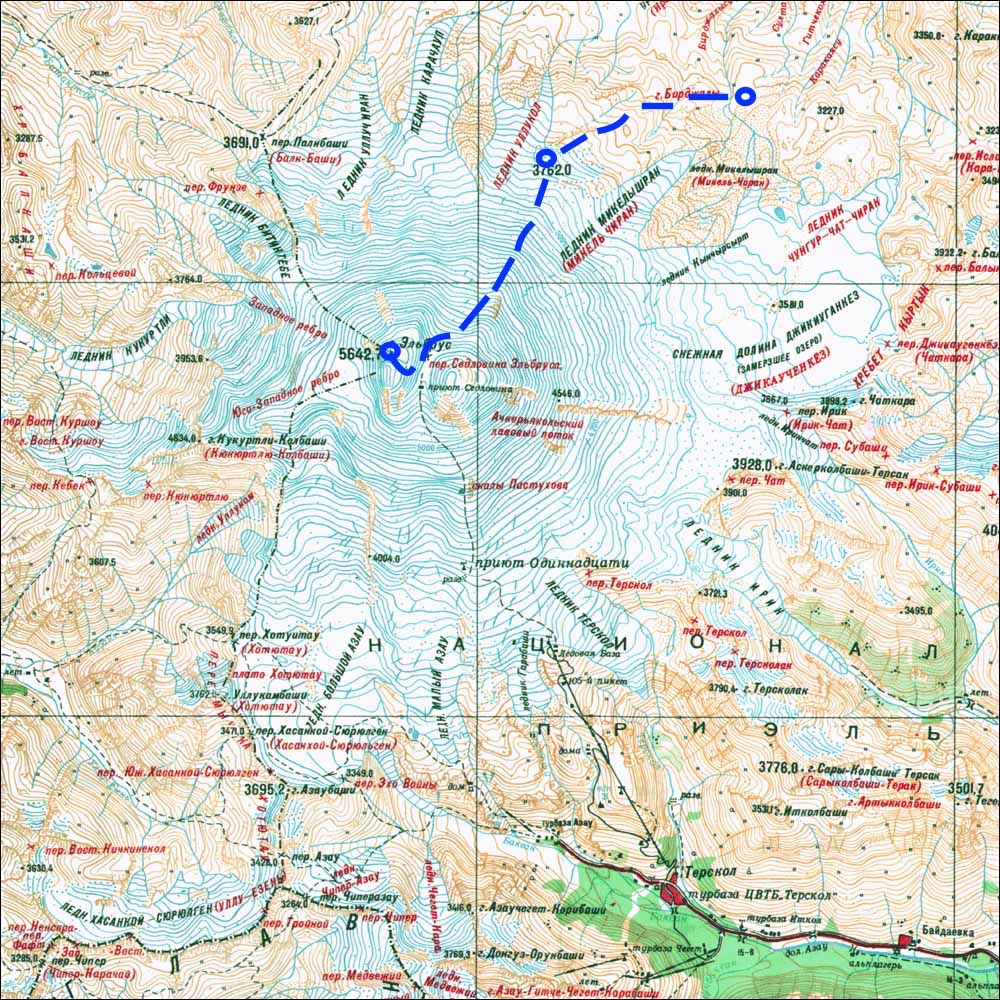
Included
When you book with Mountain Expeditions, we want you to know exactly how much the trip is going to cost you, with absolutely no hidden extras or last-minute costs. Our fully inclusive land-only price includes almost everything from the minute you land at Mineralnye Vody Airport until the time we drop you back off – even all your meals (no more awkward bill splitting – we take care of that!)
The following are included in our price:
- A UK Expedition Leader who has extensive high altitude experience
- A local Mountain Guide and assistant summit guides*
- National Park Permits & local registrations
- Visa application support including supporting documents
- Return in-country airport transfers
- All in-country meals – including our celebration meal!
- 2 nights hotel accommodation in Kislovodsk
- 8 nights camping at Basecamp or at our High Mountain Hut
- Porters to carry your personal gear (max 10kgs) to Highcamp and back
- All group equipment (tents, cookers, gas etc.)
- Full service Basecamp including showers
You should also refer to the Not Included section.
* Guide Ratios – 1 Expedition Leader/Guide for every 4 team members between Basecamp and high camp, 1 Expedition Leader/Guide for every 3 team members from high camp to the summit.
Not Included
The following are NOT included in our price:
- International flights to Mineralnye Vody Airport (MRV) – you should refer to the ‘What do I need to know about booking my flights’ FAQ further down on this page, before booking anything
- Russian visa
- Travel insurance
- Tips €50
- Items of a personal nature – phone calls, laundry, room service, alcoholic beverages, wifi etc.
- Personal clothing & equipment – please refer to the Kit List
- Unscheduled hotels and restaurant meals e.g. if bad weather grounds flights or contingency days are not used
- Any additional costs associated with leaving the expedition early
Difficulty Level
All of our UK Courses & Worldwide Expeditions come with a suggested difficulty level to help you choose the correct one. For a full explanation of the Scottish Winter, Alpine and UK Rock Climbing grading systems, this blog explains them all – Grades Explained
Grading for UK Courses
With all our UK courses please refer to the Trip Suitability section for more specific details on course expectation and technical and physical levels required.
C1 – Intro Course: open to any level and ability
C2 – Intermediate Courses: previous experience of scrambling/rock climbing or winter mountaineering
C3 – Advanced Courses: previous technical summer or winter climbing experience
Grading for Worldwide Expeditions
With all our Worldwide Expeditions you should refer to the Trip Suitability section for more specific details on the expedition expectation and technical and physical levels required. If in any doubt please don’t hesitate to contact us.
Physical
A. Good basic fitness, as for UK hill walking and mountaineering. Average rucksack weight: 6-8 kg
B. Good cardio-vascular fitness which for most people requires some training, by running, hiking and perhaps some gym work. Average rucksack weight: 8-12 kg.
C. High level of fitness coupled with physical toughness and the ability to carry a heavy rucksack for long periods. Average rucksack weight: 12-18 kg.
D. As for C, but tougher. Climbs of this grade are exceptionally strenuous and some weight loss is inevitable. Train hard and arrive fit. Welcome to ask for advice if training specifically.
E. Hard physical effort at extreme altitude which requires thorough preparation based on your experience of previous trips. Comments for ‘D’ also apply. May cause long-term fatigue after the trip.
Technical
1. Low angle snow or straightforward scrambling on rocks. Ropes are not usually required. Previous climbing experience is not essential.
2. Ropes are used principally for glacier travel and low angle snow or ice slopes. Ice axe and crampon experience necessary.
3. Short, steep sections of snow or ice up to about 50 degrees. Previous snow and ice climbing experience of Scottish III/Alpine PD is essential.
4. Long, steep snow and ice slopes with short steps of very steep ice or low grade rock climbing. Good all-round climbing ability required to Scottish III/Alpine AD.
5. Very steep ice (Scottish III/IV or harder) or rock (Hard Severe or harder). Suitable for competent mountaineers who have climbed consistently at these standards.
In-country Safety
Government Advice
We support the British Foreign & Commonwealth Office (FCO) ‘Know Before You Go’ campaign and recommend that you have a good read of the FCO Travel Advice for Russia. You should also refer to our FAQ ‘Is it safe in the Elbrus region’ further down on this page.
24/7 Expedition Medical Advisors
We work very closely with two specialist Expedition Medical Advisors (EMA’s). If you have any concerns about how your health conditions may be affected whilst in the mountains with us, you are welcome to talk with our EMA’s prior to your trip – all you need to do is let us know and we’ll put you in touch. Whilst on expedition our EMA’s are contactable 24/7 to provide our leaders with advice or assistance during any arising medical situation.
Emergency Operation Procedures
We work very hard to ensure we have a clear plan for all eventualities that may arise during the expedition. Liaising with local agencies including mountain rescue means we adhere to local regulations, have a clear evacuation process and ensure all the ‘what ifs’ are covered.
Risk Assessments & British Standards
Whilst expeditions to big mountains have inherent objective risks, we do our very best to mitigate these risks as much as possible. Careful planning and thorough consideration of all aspects of the trip means that there are very few surprises. We take advice and guidance from the British Standards BS8848 publication as well as from our experienced leaders and local agents.
FAQs
What do I need to know about booking my flights?
For this expedition we need to arrive at Mineralnye Vody Airport together.
We will suggest a flight and send out the details for members to book themselves on to. The flight will go via Moscow so members can meet here (if coming from other destinations) or start together from the UK.
Is it safe in the Elbrus region?
Firstly, regardless of where we travel, we always take advice from the Foreign & Commonwealth Office (FCO) website.
The FCO currently advise against “all but essential travel" to the Elbrus Region. Whilst it is possible to obtain travel insurance for this climb, you should read the FCO advice and be willing to accept the risks associated with travelling to this region. Our itinerary is based on Mountain Expeditions previous experience of Elbrus and the team will be led by an experienced Mountain Expeditions Expedition Leader who was been to the region before. The itinerary is also assisted by local mountain guides.
We will continously monitor the FCO prior to your expedition and keep all members up to date.
For peace of mind, during all of Mountain Expeditions previous trips to Elbrus, we have never come across any problems and have instead, just found friendly, helpful people.
Do I need a visa?
Yes. Despite the visa application being comprehensive, it is straightforward however, you are required to have an ‘invitation letter’.
Once you have signed up for the trip, we need your passport details. Once we have this, we will send you a personalised invitation letter and a useful PDF on how to apply for a Russian visa to help you through the process.
NB. Please note that you are currently required to go to the visa office in person. These offices are in Manchester, Edinburgh and London
What sort of insurance do I need?
To join our expeditions it is mandatory that all members have insurance that covers helicopter rescue & evacuations.
There are many companies to choose from including: BMC, Snowcard, Ripcord, DogTag etc. However, due to the FCO advice, we've found the BMC to be the main insurance provider for Elbrus over the past few years.
Do Mountain Expeditions use a local in-country agent?
Yes, we work very closely with our local in-country agency who are highly regarded as being one of the (if not the) best on the mountain. We have 24/7 contact them during the expedition and they are always on standby to help assist with anything we may need throughout the expedition.
What is the food like?
The food is really good and plentiful - but it is Russian! It is all prepared on the mountain by our fantastic cooks. Generally you can expect 2 hot meals a day and a good packed lunch. We would advise you to bring a few of your favourite snacks with you.
Any special dietary requirements can easily be catered for – just let us know.
What if I'm vegetarian or have dietary requirements?
All you need to do is let us know your specific requirements and we will pass them on to our local cook team. They are very used to dealing with dietary requirements and whatever yours is, it wont be a problem at all.
Do Mountain Expeditions use a Snowcat on summit night? Is this cheating?
No, Mountain Expeditions do not use a Snowcat, this is only available on the south side of the mountain - on the north side of Elbrus it's all leg power!
What are the mountain huts/tents like?
Really cool! The Basecamp Tents are big fixed tents that sleep 3 on raised camp beds. The high Mountain Huts are fixed structures that have been converted to sleep the team. They are warm, dry, basic and quite fun!
How cold will it be?
This really depends on the weather but you should always be prepared for the worst. If you follow the kit list you won’t be far off. A down jacket is essential as well as a good set of gloves/mitts.
Do I need to have crampon experience?
Whilst some crampon experience would be beneficial it is not essential. Your Mountain Expeditions leader will check and run through a crampon session with the team and there is plenty of time to master the basics before you make your summit attempt.
Can I hire kit?
Yes, we have plenty of hire kit available. It is also possible to hire a few items locally.
What sort of boots do I need?
Elbrus can be cold and snowy so good boots are essential. Ideally you need a 6000m boot – Scarpa Omega, Sportiva Spantik, Nepal Extremes etc. You need to be able to wear nice thick mountain socks and still have plenty of room to wiggle your toes. If you are unsure about the boots you have, just ask.
Why do you cap the team at 8 members?
On big mountains like Elbrus we don't believe leading teams bigger than 8 members is good practice as it doesn't offer a very personable experience. Sure, having bigger teams of 12+ would be more profitable for us but we prefer to keep the teams smaller and ratios and summit success rate higher.
Can I have a 1:1 summit guide?
We have an excellent 1:3 summit guide ratio, however if you would like a personal guide for summit we can arrange this at an additional cost.
If you contact us and let us know, we can get this arranged for you.
Can I book a private expedition?
Yes! If you have your own group or would prefere our 1:1 private expeditions then you can simply choose the dates that work best for you and leave the rest to us.
We will set up a trip for you on our website with your own dates and a private URL - your team can all join the expedition here.
If you have any questions about this option then please ask us!
How many times has Mountain Expeditions been to Elbrus?
Over the past 10 years we have organised and successfully delivered 16 expeditions to Elbrus, 13 to the south and 3 to the north.
The majority of our local guides have 60+ summits each!
Do I need glacial travel experience?
Whilst some glacial travel experience would be beneficial it is not essential. The terrain is very straightforward and you will have ample time to get used to walking in crampons and in a rope team. Your Mountain Expeditions leader will check and run through a glacial travel session with the team and there is plenty of time to master the basics before you make your summit attempt.

